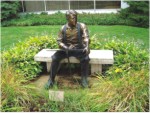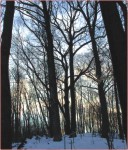Feature
The woods are lovely, dark and deep…
And miles to go before I sleep…
Mohammad Shahidul Islam
The woods are lovely, dark and deep.
But I have promises to keep,
And miles to go before I sleep,
And miles to go before I sleep.
 The appeal of these four lines from Robert Lee Frost's Stopping By Woods On A Snowy Evening is another brilliant creation like the painting of Monalisa by Leonardo Da Vinci. In every backdrop of our life, these 4 lines are haunting, calming and sonorous; all the time workable and reminiscent from different angles. Like Monalisa the poem is also mysterious and over discussed. “Stopping by Woods on a Snowy Evening” is generally regarded as Frost's magnum opus. The poem was included in Frost's collection New Hampshire (1923) for which he won the first of his four Pulitzer Prizes. It is Frost's most famous poem, and one which he himself viewed as his “best bid for remembrance.” It is also perhaps Frost's most frequently taught and anthologized poem. The poem gives us privilege to enjoy the nature from both philosophic and pleasant point of views. ''Stopping by woods on a snowy evening'' is a simple story that has deep philosophic ideas woven into it. Let's see the whole poem for further academic capacities: The appeal of these four lines from Robert Lee Frost's Stopping By Woods On A Snowy Evening is another brilliant creation like the painting of Monalisa by Leonardo Da Vinci. In every backdrop of our life, these 4 lines are haunting, calming and sonorous; all the time workable and reminiscent from different angles. Like Monalisa the poem is also mysterious and over discussed. “Stopping by Woods on a Snowy Evening” is generally regarded as Frost's magnum opus. The poem was included in Frost's collection New Hampshire (1923) for which he won the first of his four Pulitzer Prizes. It is Frost's most famous poem, and one which he himself viewed as his “best bid for remembrance.” It is also perhaps Frost's most frequently taught and anthologized poem. The poem gives us privilege to enjoy the nature from both philosophic and pleasant point of views. ''Stopping by woods on a snowy evening'' is a simple story that has deep philosophic ideas woven into it. Let's see the whole poem for further academic capacities:
Stopping By Woods On A Snowy Evening
By-Robert Frost
"Whose woods these are I think I know.
His house is in the village though;
He will not see me stopping here
To watch his woods fill up with snow.
My little horse must think it queer
To stop without a farmhouse near
Between the woods and frozen lake
The darkest evening of the year.
He gives his harness bells a shake
To ask if there is some mistake.
The only other sound's the sweep
Of easy wind and downy flake.
The woods are lovely, dark and deep.
But I have promises to keep,
And miles to go before I sleep,
And miles to go before I sleep.
 The poem consists of four (almost) identically constructed stanzas. Each line is iambic, with four stressed syllables: Within the four lines of each stanza, the first, second, and fourth lines rhyme. The third line does not, but it sets up the rhymes for the next stanza. For example, in the third stanza, queer, near, and year all rhyme, but lake rhymes with shake, mistake, and flake in the following stanza. The notable exception to this pattern comes in the final stanza, where the third line rhymes with the previous two and is repeated as the fourth line. We should not be hoodwinking by the simple words and the easiness of the rhymes; this is a very difficult form to achieve in English without debilitating a poem's content with forced rhymes. The poem consists of four (almost) identically constructed stanzas. Each line is iambic, with four stressed syllables: Within the four lines of each stanza, the first, second, and fourth lines rhyme. The third line does not, but it sets up the rhymes for the next stanza. For example, in the third stanza, queer, near, and year all rhyme, but lake rhymes with shake, mistake, and flake in the following stanza. The notable exception to this pattern comes in the final stanza, where the third line rhymes with the previous two and is repeated as the fourth line. We should not be hoodwinking by the simple words and the easiness of the rhymes; this is a very difficult form to achieve in English without debilitating a poem's content with forced rhymes.
Using his imagery and figurative language, Frost has essentially utilized two images to illustrate the woods, or his paradise. With the image of snow indicating purity, and the deep darkness portraying a certain type of mystery, Frost illuminates his heaven with harmony and tranquility. Yet at the same time he includes certain mysteries to the 'lovely, dark and deep' woods that he is yet to learn about. However, the two lines of greatest symbolism are those that Frost concludes the poem with.
When revealing that he has 'promises to keep, and miles to go before I sleep and miles to go before I sleep', Frost does not merely imply that he has a long journey ahead of him before he can sleep. He hints at the fast paced movement of the world today, where man has lost the time to just sit back and take a good look at the world around them. Frost suggests that he too has become a part of this world, and hence cannot stay any longer to enjoy this calmness.
“Stopping by Woods on a Snowy Evening,” like many of Frost's poems, explores the theme of the individual caught between nature and civilization. The speaker's location on the border between civilization and wilderness echoes a common theme throughout American literature. The speaker is drawn to the beauty and allure of the woods, which represent nature, but has obligations“promises to keep”which draw him away from nature and back to society and the world of men. The speaker is thus faced with a choice of whether to give in to the allure of nature, or remain in the realm of society. Some critics have interpreted the poem as a meditation on death, the woods represent the allure of death, perhaps suicide, which the speaker resists in order to return to the mundane tasks which order daily life.
Critics generally agree that its central theme is the speaker's dilemma in choosing between the allure of nature and the responsibilities of everyday life in human society. However, the ambiguity of the poem has lead to extensive critical debate. Some conclude that the speaker chooses, by the end of the poem, to resist the temptations of nature and return to the world of men. Others, however, argue that the speaker's repetition of the last line “And miles to go before I sleep,” suggests an indecisiveness as to whether or not he will, in fact, “keep” the “promises” by which he is obligated to return to society. Many have pointed out that this “ambiguity” is in part what makes the poem so appealing.
Another standard interpretation is that the speaker is contemplating suicide and the woods, “lovely, dark, and deep,” represent the allure of death as a means of escape from the mundane duties of daily life. Still others, however, such as Philip L. Gerber, argue that “Stopping by Woods on a Snowy Evening” is most importantly a “lyric” poem, which should be appreciated in terms of its formal, metrical qualities, such as the complex, interlocking rhyme scheme, rather than its content or “meaning.” Gerber notes that “Stopping by Woods on a Snowy Evening” is “widely regarded, metrically, as Frost's most perfect poem.” Critics also point to the mood or tone of the poem, as created by its formal properties, as one of a person caught up in a reverie; the hypnotic quality of the repeated closing lines, in particular, suggests a chant or spell.
Not that we must return too often to that darkest interpretation of the poem. Beauty alone is a sufficient siren; a sufficient protection against her seduction, an unwillingness to give up on society despite the responsibilities it imposes. The line "And miles to go before I sleep" need not imply burden alone; perhaps the ride home will be lovely, too. Indeed, the line could be read as referring to Frost's career as a poet, and at this time he had plenty of good poems left in him.
(Mohammad ShahidulIslam studied English Literature at Chittagong University)
|
